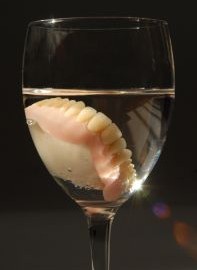T
Although in general the dental health of the UK has improved over the last 30 years, a disproportionately large number of pensioners have the misfortune to rely on dentures for their everyday mastication.
With extremely rare exceptions, false teeth never fit properly and the wearer never fully comes to terms with having his or her mouth full of foreign bodies. Their inherent discomfort is measured by the FT 100 Index and to date, no dentures, either whole or partial, have ever exceeded a score of 3.9 on this scale.
Apart from riveting or spot welding, no type of fixative will hold dentures securely in place, and they can be ejected at speed during such mundane activities as coughing, sneezing, whistling and playing the trumpet. There have been numerous instances of serious injury caused to unwary bystanders by high-velocity dentures.
Keeping false teeth clean is virtually impossible and over a relatively short period of time, you can expect them to become the colour of sand and the plate itself to be encrusted with a dense layer of unidentifiable detritus. Soaking overnight in a proprietary cleaner has little effect, and may cause serious neurotic episodes if you wake during the night to see two sets of teeth bubbling at you. Sandblasting may have a limited effect if repeated daily, but this should never be attempted with the dentures still in place.
Although the design and manufacture of false teeth has improved to some extent, many pensioners in the north still prefer wooden teeth attached to their gums with oak dowels made by Robert ‘Mouseman’ Thompson, the celebrated cabinet maker of Kilburn. Pensioners in Aberdeen often prefer the traditional granite tooth, which is usually held in place by high viscosity North Sea oil.

